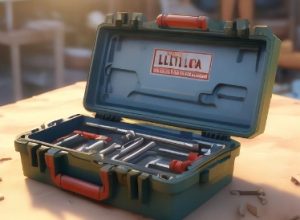Our Location
304 North Cardinal St.
Dorchester Center, MA 02124

The power tools market is dominated by several key brands renowned for their innovation, quality, and reliability. Below is an extensive analysis of the top ten brands, including their notable models and contributions to the industry.
DeWalt is a globally recognized brand known for its rugged and durable tools. A subsidiary of Stanley Black & Decker, DeWalt focuses on high-performance products designed for professionals.
Notable Models:
Makita is a Japanese brand renowned for its high-quality and innovative tools. With a strong focus on cordless solutions, Makita is a leader in lithium-ion battery technology.
Notable Models:
Milwaukee is synonymous with innovation, offering cutting-edge tools designed for demanding applications. Its M12 and M18 battery platforms are industry-leading in terms of power and runtime.
Notable Models:
Bosch is a German powerhouse in the power tools industry, known for its precision engineering and wide range of products. It caters to both professionals and DIY enthusiasts.
Notable Models:
Ridgid is a trusted brand offering durable and affordable tools. Known for its commitment to reliability, Ridgid is a favorite among contractors and tradespeople.
Notable Models:
Ryobi focuses on providing affordable, user-friendly tools without compromising on quality. It is a popular choice for DIY enthusiasts and homeowners.
Notable Models:
Hitachi, now rebranded as Metabo HPT, offers reliable and efficient tools for professionals and DIY users. It has a long-standing reputation for quality and innovation.
Notable Models:
Black+Decker is a household name in the power tools sector, offering affordable and easy-to-use products. It is ideal for DIY projects and home improvement tasks.
Notable Models:
Craftsman is a trusted name in power tools, known for its durability and value. With a focus on reliability, Craftsman tools are widely used in garages and workshops.
Notable Models:
Festool is a premium brand specializing in precision tools for woodworking and professional construction projects. It is highly regarded for its innovative designs and superior performance.
Notable Models:

The competitive landscape among these top power tool brands drives constant innovation. Each company invests heavily in research and development to introduce cutting-edge features that enhance performance, safety, and user convenience.
Brands like Makita, Milwaukee, and DeWalt have focused on advancing battery technology to increase tool runtime, reduce charging time, and improve durability. Milwaukee’s M18 REDLITHIUM batteries and Makita’s LXT system are prime examples, offering long-lasting power for demanding applications. DeWalt’s FLEXVOLT batteries automatically switch between 20V and 60V, providing versatility across a wide range of tools.
The shift from brushed to brushless motors has been a game-changer. Brushless motors are more efficient, generate less heat, and have a longer lifespan. Brands like Bosch, Makita, and Metabo HPT are leaders in incorporating brushless motors in their products, including the Bosch GDX18V-1800C and the Makita XDT16Z impact driver.
Modern power tools now come equipped with smart features like Bluetooth connectivity, enabling users to monitor tool performance and battery status through mobile apps. Milwaukee’s ONE-KEY system and DeWalt’s Tool Connect are standout examples of this integration. These features allow for tool tracking, custom configurations, and diagnostics.
The demand for portable and easy-to-use tools has led to a trend of compact and lightweight designs. Ryobi’s ONE+ series and Black+Decker’s MAX lineup exemplify tools that are both powerful and ergonomic, making them ideal for home users and professionals who prioritize mobility.
Certain brands cater to specific needs. For instance, Festool specializes in precision woodworking, while Ridgid excels in plumbing and HVAC tools. Understanding the primary application helps users select the most suitable brand and model.
Professional users often prioritize durability and after-sales support. Brands like DeWalt, Makita, and Milwaukee offer extended warranties and robust customer service, making them a preferred choice for contractors.
For budget-conscious buyers, Ryobi and Black+Decker provide cost-effective solutions without sacrificing quality. Their entry-level tools are ideal for occasional use and DIY projects.
As environmental concerns grow, manufacturers are focusing on creating eco-friendly tools. Bosch’s Green Technology and Makita’s efforts to reduce energy consumption in production processes are paving the way for sustainable power tools.
Safety remains a top priority, with brands incorporating features like automatic shut-off, anti-vibration technology, and electronic safety brakes. For example, Milwaukee’s Rapid Stop braking system and Bosch’s Kickback Control significantly reduce the risk of accidents.
Cordless tools are expected to dominate the market further, with advancements in lithium-ion batteries and wireless charging systems. Metabo HPT’s MultiVolt system, which seamlessly transitions between cordless and corded operation, highlights this trend.
The power tools industry continues to evolve, driven by innovation, customer needs, and sustainability goals. The top brands, including DeWalt, Makita, Milwaukee, and Bosch, lead the charge by offering versatile, high-performance tools that cater to both professional and DIY markets. Their wide range of models ensures that users can find the perfect tool for any application. Whether it’s Festool’s precision woodworking tools or Ryobi’s affordable DIY solutions, the future of power tools promises enhanced efficiency, safety, and convenience for all users.
